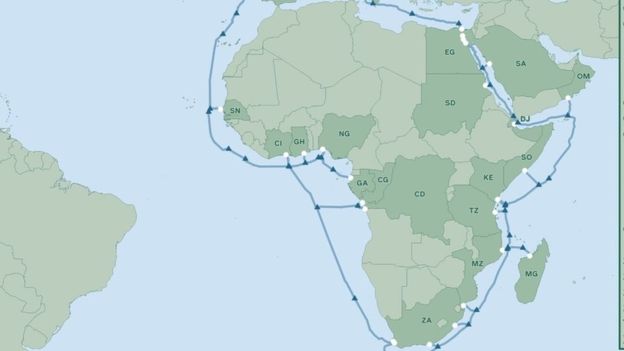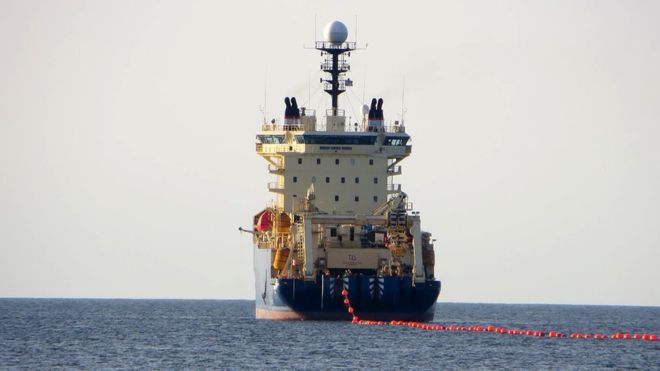Facebook is teaming up with telecoms companies to build a 37,000km (23,000-mile) undersea cable to supply faster internet to 16 countries in Africa.
Its length - almost equal to the circumference of the Earth - will make it one of the longest, it said.
It is part of a long-running bid by Facebook to take its social media platform to Africa's young population.
Ready for use by 2024, it will deliver three times the capacity of all current undersea cables serving Africa.
"When completed, this new route will deliver much-needed internet capacity, redundancy, and reliability across Africa, supplement a rapidly increasing demand for capacity in the Middle East, and support further growth of 4G, 5G, and broadband access for hundreds of millions of people," said Facebook in a blog.
Africa lags behind the rest of the world when it comes to internet access, with four in 10 people across the continent having access to the web, compared with a global average of six in 10.
But the continent represents huge opportunities for technology firms and businesses with its population of 1.3 billion.
The cost of the 2Africa project - which will connect Europe and the Middle East to the continent - has not been disclosed but Bloomberg reported it could be close to $1bn (£820m).

Sub-sea cables carry the vast majority of the world's inter-continental data. They can handle much more data and offer faster transmission at a lower cost compared with other methods.
The cable - which will be built by Nokia Oyj's Alcatel Submarine Networks - will run along the bottom of the Atlantic Ocean, the Indian Ocean, the Mediterranean Sea and the Red Sea.
It will be buried deeper than previous systems for greater protection against external damage from things such as ships' anchors.
The fibre-optic cables will have double the capacity of older ones, making use of Spatial Division Multiplexing (SDM1) technology.
Facebook is teaming up with Johannesburg-based MTN Group, Telecom Egypt, Vodafone and Orange SA.
Vodafone said it would pave the way for developing digital businesses on the continent.
"We need to ensure that there is enough internet capacity to not only get people online, but to help build a modern digital society that includes services that require a large amount of data transfer, such as cloud computing or video," said Nick Gliddon, director of Vodafone Carrier Services.
As well as helping businesses, it will also improve healthcare and education, he added.
Latest Stories
-
DAMC, Free Food Company, to distribute 10,000 packs of food to street kids
55 minutes -
Kwame Boafo Akuffo: Court ruling on re-collation flawed
1 hour -
Samuel Yaw Adusei: The strategist behind NDC’s electoral security in Ashanti region
1 hour -
I’m confident posterity will judge my performance well – Akufo-Addo
1 hour -
Syria’s minorities seek security as country charts new future
2 hours -
Prof. Nana Aba Appiah Amfo re-appointed as Vice-Chancellor of the University of Ghana
2 hours -
German police probe market attack security and warnings
2 hours -
Grief and anger in Magdeburg after Christmas market attack
2 hours -
Baltasar Coin becomes first Ghanaian meme coin to hit DEX Screener at $100K market cap
3 hours -
EC blames re-collation of disputed results on widespread lawlessness by party supporters
3 hours -
Top 20 Ghanaian songs released in 2024
4 hours -
Beating Messi’s Inter Miami to MLS Cup feels amazing – Joseph Paintsil
4 hours -
NDC administration will reverse all ‘last-minute’ gov’t employee promotions – Asiedu Nketiah
4 hours -
Kudus sights ‘authority and kingship’ for elephant stool celebration
4 hours -
We’ll embrace cutting-edge technologies to address emerging healthcare needs – Prof. Antwi-Kusi
5 hours

